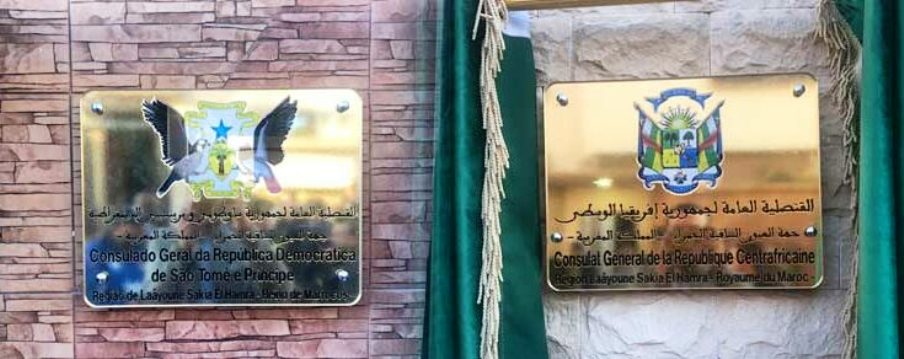Central Africa Republic, Sao Tome & Principe Open Consulate General in Laayoune
 After the Comoros Islands and Gambia, and most recently Guinea and Gabon comes the turn of Central Africa Republic (CAR) and the Republic of Sao Tome & Principe to challenge the Polisario and its supporters by opening this Thursday, a Consulate General in Laayoune, capital of the Moroccan Sahara.
After the Comoros Islands and Gambia, and most recently Guinea and Gabon comes the turn of Central Africa Republic (CAR) and the Republic of Sao Tome & Principe to challenge the Polisario and its supporters by opening this Thursday, a Consulate General in Laayoune, capital of the Moroccan Sahara.
The inaugural ceremony of the Consulate of Sao Tome & Principe in Laayoune, was chaired by the Moroccan Minister of Foreign Affairs, African Cooperation and Moroccans living abroad, Nasser Bourita and his Santomean peer Elsa Teixeira de Barros Pinto.
The same day, Moroccan top diplomat and his Central African counterpart, Sylvie Baïpo-Temon presided over in the city of Laayoune, the opening ceremony of the Consulate General of CAR.
This is the fourth and fifth diplomatic representation to be installed in Laayoune, after the Honorary Consulate of the Ivory Coast opened last June, the Consulate General of the Union des Comoros, operational since last December, the Consulate General of Gabon and the Republic of Guinea-Conakry opened on Jan.17, respectively in Laayoune and Dakhla.
The opening of these consular missions by the African countries, friends of Morocco, in these two landmark southern provinces is a serious setback for the Polisario separatist movement and its Algerian sponsors who continue to suffer resounding diplomatic failures in their showdown with Morocco on the Sahara issue.
According to the Moroccan foreign minister, many other friendly countries intend to open soon diplomatic representations in the southern provinces of the Kingdom as a token of solidarity with Morocco and recognition of the Moroccanness of the Sahara.
It is a bold move made by these brotherly and friendly countries of the Kingdom which installed their diplomatic missions in the provinces of Laayoune or Dakhla, putting an end to the claims the Polisario and the few countries that still support them, while the self-proclaimed sahrawi republic “SADR” is not recognized as a sovereign State neither by the UN nor by any other regional or international organization, except the African Union, which was forced to it during the cold war era.

